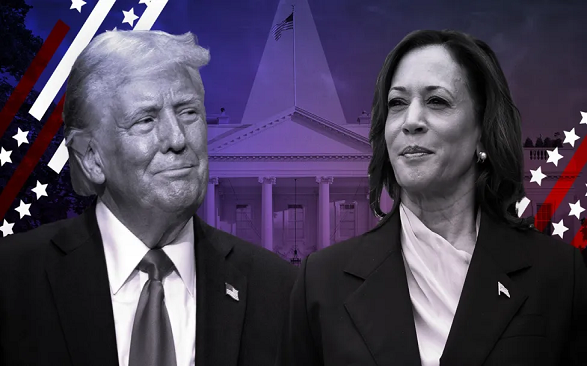You may call it selfish, but crypto industry players in the United States (U.S) generally believe that if the U.S would ever have a chance of becoming a crypto-friendly jurisdiction, who becomes President in the coming election is crucial. Over the years, the Biden administration has been largely accused of regulation by enforcement, an approach which often stifles crypto innovations. As far as the U.S crypto industry is concerned, the outgoing Biden administration has sent crypto innovation outside the U.S. Consequently, the U.S is not presently globally competitive for crypto innovators.
Gary Gensler, the U.S Securities and Exchange Commission (U.S. SEC) boss, has been breathing on crypto innovators’ necks. As far as Gensler is concerned, the Investments and Securities Act of 1939 adequately accommodates crypto assets, requiring registration of securities. Nominated by President Biden in February 2021 and confirmed by the U.S Senate in April 2021, Gensler has argued that the crypto “field is not going to reach any of its potential if it tries to stay outside of our laws.”
However, U.S crypto players, generally, do not believe that the existing regulatory framework is compatible with the unique features of crypto assets. This is why a number of U.S crypto companies have relocated abroad. Seen to be an unfriendly regulatory approach, the hostile climate has been described as “Operation Chokepoint 2.0”—a coordinated and sophisticated crackdown against the crypto industry.
Coming up in November, the 2024 U.S presidential election is just around the corner. In the 2020 presidential election, of approximately 240 million eligible Americans voters, about 158,427,986, representing 66.1% of eligible voters, voted. Today, there are up to 50 million Americans who use crypto. Certainly, with a figure as huge as that, it is not so difficult to understand why the U.S crypto industry may be imagining—and perhaps rightly so—that it has some level of bargaining power that may be too risky for any serious presidential candidate to fail to pay attention to. As both the (potential) Democratic Party and the Republican Party presidential candidates respectively —Kamala Harris and Donald Trump—are looking for that trump card (pun unintended), who is the better U.S presidential candidate for the crypto industry?
We compare Donald Trump’s and Kamala Harris’s support for cryptocurrency in the United States, based on what both candidates have said or done about crypto in the past and also considering recent developments.
Donald Trump, presidential candidate for the Republican Party
Donald Trump has expressed varying—as well as contrasting—opinions about crypto in the U.S. For the purpose of our analysis, we will classify these opinions under two broad parts: The Anti-Crypto Trump and the Pro-Crypto Trump:
The Anti-Crypto Trump
First, in a Twitter thread in July 2019, Trump described bitcoin and other cryptocurrencies as things “which are not money, and whose value is highly volatile and based on thin air.”
Trump expressed his concerns that “unregulated crypto assets can facilitate unlawful behavior, including drug trade and other illegal activity”.
He went further to state his position on privately issued virtual currencies such as Facebook’s Libra, pointing out that if “Facebook and other companies want to become a bank, they must seek a new banking charter and become subject to all banking regulations, just like other banks, both national and international.”
Second, in June 2021, Trump described bitcoin as a scam in an interview with Fox Business when he said bitcoin “just seems like a scam”.
In the same interview, Trump said he doesn’t like bitcoin “because it’s another currency competing against the dollar”.
In order to put bitcoin adoption under effective control, Trump recommended that it should be regulated “very very high”. In other words, strict regulation was necessary in order to ensure that decentralized cryptocurrencies do not compete with fiat currencies.
In August 2021, Trump warned that investing in cryptocurrencies is “potentially a disaster waiting to happen.” This was during an exclusive interview on “Varney & Co.” Trump added that he has “not been a big fan” of cryptocurrencies and does not invest in them.
Trump was of the view that cryptocurrency investment “hurts the United States currency” and “we should be invested in our currency.”
In fact, Trump said cryptocurrencies “may be fake.”
The Pro-Crypto Trump
Trump’s views on crypto have sharply shifted from calling bitcoin a “scam” to promising to make the U.S “the crypto capital of the planet and the Bitcoin superpower.” Whether this sudden change is the power of new knowledge, the enthusiasm of embracing a refreshing opportunity, or the magic of desperate politics, it is not very clear at the time of writing. But whatever it is and for whatever it is worth, Trump is presently pro-crypto.
First, Trump’s campaign accepts crypto donations. He has received millions in crypto contributions, estimated at about $25million dollars currently.
Second, sensing Gensler’s leading role in the execution of what has been described as Operation Chokepoint 2.0 against the crypto industry in the U.S, Trump has vowed to fire Gensler on day one of stepping into office as U.S President.
Third, Trump has promised to terminate the plan by the U.S government to create a central bank digital currency (CBDC). Many crypto industry players, as well as some members of the public, have criticized the idea of a CBDC particularly over potential abuse by the U.S government and citizen privacy concerns.
Also, for an industry-led regulation in the crypto sector, Mr. Trump has promised to establish a Bitcoin and crypto presidential advisory council, if elected into office.
Moreover, Trump has also pledged to hold (or “hodl” in crypto parlance) bitcoin in order to “supercharge the U.S. dollar” by acquiring one million bitcoins as a federal government. This was stated by the U.S. Senator Cynthia Lummis at Bitcoin Conference, Nashville, Saturday 27 July 2024.
Read also: Donald Trump promises to make the U.S “crypto capital of the planet”.
Kamala Harris, potential presidential candidate for the Democratic Party
First, unlike Trump, Vice President and potential presidential candidate of the Democratic Party Kamala Harris has been either relatively silent or generally conservative on issues around cryptocurrencies. Harris’s stance on crypto is less clear than Trump’s.
Harris has pointed out the need for consumer protection and regulation to prevent crypto-related fraud and illicit activities. As a senator, she co-sponsored the “Digital Asset Anti-Money Laundering Act” to strengthen AML regulations for cryptocurrencies.
In 2021, Harris stated that cryptocurrencies “have the potential to be a tool for empowerment” and that the U.S should “be a leader” in their development. However, as the deputy to Joseph Biden, most players in the crypto sector will disagree that the U.S has been anything but a leader in the crypto space, at least as far as innovation-friendly regulation is concerned.
Meanwhile, after Kamala’s endorsement by President Joseph Biden, Harris’s campaign advisers have been reportedly contacting key players in the crypto industry. These players include crypto exchange Circle, Coinbase, and Ripple Labs.
In contrast to the general perception that the Biden administration is anti-business, Harris wants to demonstrate leadership that is “pro-business”. According to billionaire and crypto enthusiast Mark Cuban, “I’m getting multiple questions from her camp about crypto”, he told Decrypt. “So I take that as a good sign.” Cuban believes that Harris would be “far more open”, compared to President Joseph Biden, her current boss.
As reported by The Block, a source who spoke with a member of Harris’s campaign team wants to learn more about crypto. They wanted to know why crypto is getting a lot of attention and wanted more information on past conversations the crypto industry had with President Joe Biden’s advisor.
Harris obviously understands that crypto matters, and wants to have a position on it. But considering the approach of initially engaging key players, Harris does not seem to be in a hurry to start with making promises. Perhaps she wants clarity first.
While President Joseph Biden has apparently won himself a medal for leading a harsh regulatory climate for crypto innovations in the U.S, crypto industry leaders do not seem to think that simply lumping Harris with the administration and dismissing her is the wise thing to do. A Harris presidency could signify a shift—a significant shift from the status quo.
While Harris has received over $100 million in campaign donations within 24 hours of her endorsement by President Joseph Biden, the amount of crypto donations received is unknown.
If Harris succeeds in resetting relations with the crypto industry, this may cause Trump some headache.
Read also: Governments with the biggest bitcoins in the world
Americans decide.
Politicians are born to make electoral promises, but keeping them is a different ball game. Politicians know this too. So typically, they make varying levels of calculated risks. From a politics perspective, it may all boil down to an interplay of striking a balance between process and results. And this means different things to different people, especially politicians.
On the one hand, Trump has shown that he can play ball, even if he would eventually discover later that the devil is in the details. If nothing, Trump’s first tenure in the White House clearly shows that walking the talk is not as easy as talking the walk. Undoubtedly, Trump is presently trying to maximize the opportunities the Biden administration has provided to him to potentially become America’s first “crypto president”. How far can Trump go with getting the result in November?
On the other hand, Harris appears to be taking her time, taking initial steps to gather intelligence about the crypto sector before making any commitments. Understandably, as the incumbent Vice President in the current administration, she can’t afford to take any steps or say anything that the opposition may jump on to possibly question her credibility. Harris also has the challenge of setting her own agenda, and not appear to be stuck with the rhetoric of the Biden administration which she is still a part of. As November draws closer, it remains to be seen how far Harris can go with getting the result.
However you see it, one thing is clear enough—single-issue voters are out there. And millions of these single-issue voters will be American crypto enthusiasts.
Image credit: BBC/Getty Images
Read also: U.S. presidential election to keep driving crypto market volatility, report says
Discover more from Crypto Asset Buyer
Subscribe to get the latest posts sent to your email.





